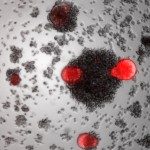Link to Pubmed [PMID] – 11859360
Nature 2002 Feb;415(6874):871-80
We have sequenced and annotated the genome of fission yeast (Schizosaccharomyces pombe), which contains the smallest number of protein-coding genes yet recorded for a eukaryote: 4,824. The centromeres are between 35 and 110 kilobases (kb) and contain related repeats including a highly conserved 1.8-kb element. Regions upstream of genes are longer than in budding yeast (Saccharomyces cerevisiae), possibly reflecting more-extended control regions. Some 43% of the genes contain introns, of which there are 4,730. Fifty genes have significant similarity with human disease genes; half of these are cancer related. We identify highly conserved genes important for eukaryotic cell organization including those required for the cytoskeleton, compartmentation, cell-cycle control, proteolysis, protein phosphorylation and RNA splicing. These genes may have originated with the appearance of eukaryotic life. Few similarly conserved genes that are important for multicellular organization were identified, suggesting that the transition from prokaryotes to eukaryotes required more new genes than did the transition from unicellular to multicellular organization.

